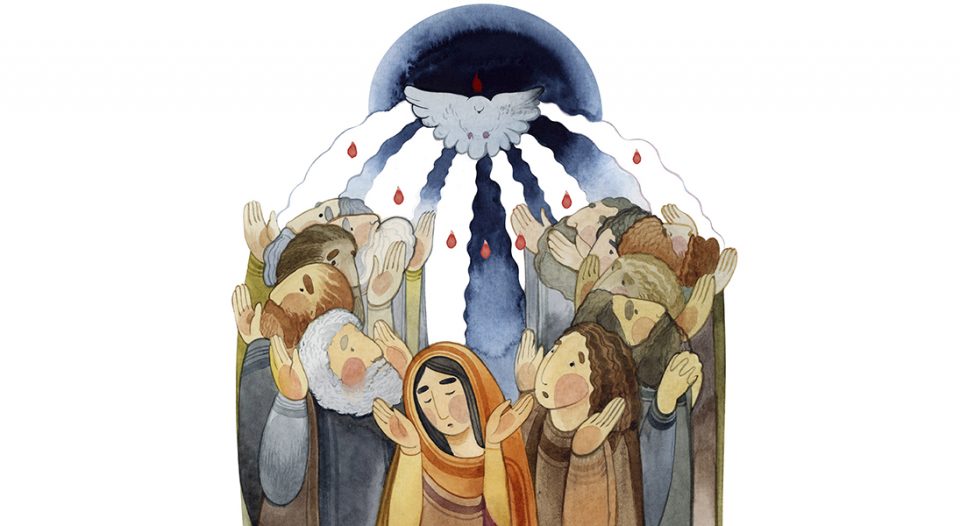Lectionary for June 5, 2022
Pentecost Sunday
Acts 2:1-21; Psalm 104:24-34, 25b;
Romans 8:14-17; John 14:8-17
Folks who have been reading this column for a while know that Pentecost is one of my favorite holidays. God’s presence being made manifest to God’s people with multiple voices, little fires and strong winds is a continuing occurrence in the Bible. At the first Christian Pentecost in Jerusalem, God repeated the earlier actions of the first Pentecost at Sinai (Exodus 20:18) by manifesting the divine Spirit with multiple voices and little fires (Acts 2:2-4). We shouldn’t think at all that the God of the Hebrew Bible/Old Testament is dissimilar from the God we encounter in the New Testament. God has always desired to reveal Godself to the Beloved Community. God the Parent, Jesus and the Spirit are unified by purpose and action and self-revelation, as this week’s Gospel reading from John shows.
Philip, a disciple of great courage and devotion, asked Jesus to show God the Father to the disciples. He knew that Jesus was/is God’s anointed one. Philip also knew that Jesus, if he wanted to, could show the disciples God’s very self. But Jesus didn’t give Philip what he had asked for, telling him that he had already seen God by seeing Jesus.
Jesus said he was in God the Father and the Father was in him, and he offered several proofs. First, Jesus referenced his words and teaching. He didn’t speak the words of his repeated sermons and parables on his own, but only because God had given him them to speak (John 14:10). Further, he performed works and miracles because of God’s power and presence in him (10-11). Finally, Jesus said the miraculous signs that the disciples would do in his name would be done to bring glory to God through the work of Jesus (13). When Jesus spoke, worked a miracle or empowered his disciples to work miracles, it was God the Father acting, inspiring and empowering Jesus. When we see Jesus act, we see God acting, and vice versa.
Jesus promised his disciples that the Spirit of truth will abide in them, just as, a few verses later, he promised to abide in his disciples if they abide in him.
This oneness of action doesn’t just exist between Jesus and God the Parent, however. When Jesus promised to send the Spirit (16), he spoke of another Paraclete (advocate, intercessor, helper). If the Spirit is another Paraclete, who is the first? Well, it seems to be Jesus, in my reading. If Jesus intercedes for us at the right hand of God (Romans 8:34), he acts as Paraclete. Jesus promised his disciples that the Spirit of truth will abide in them (John 14:17), just as, a few verses later, he promised to abide in his disciples if they abide in him (John 15:4). At least here in John, Jesus and the Spirit do the same work (act as a Paraclete) in the same place (within the disciples).
God the Parent, Jesus and the Spirit are all in each other, doing the same work and mutually recognizable in it. God glorifies Godself in all of God’s actions. Great! But what does that mean for us? Jesus’ theological, Christological and pneumatological insights about how God shares work and mission led him to an observation about his followers: “If you love me, you will keep my commandments” (John 14:15).
Just as God is visible in Jesus though Jesus’ actions, and just as Jesus and the Spirit are unified by their common work in interceding for and supporting the disciples, so Jesus is visible in us when we unite with him in his work. Jesus feasted with folks on the margins of polite society. He repeatedly engaged in conversations with religious leaders, again, over feasts, answering their questions and correcting their assumptions. He provided food for the hungry and healed the sick and injured. He insisted that his followers visit those in prison. Jesus calls us to do all of these things as well.
Having good trinitarian theology is worthless if we don’t love Jesus by obeying his commandments to love and serve each other. And when we do, the Spirit of Pentecost, Jesus the Messiah, and God the Parent will be visible in our lives.





